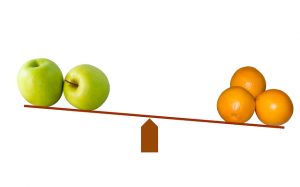 Guilt seems to be inherent in parenting. It doesn’t really matter how you parent, it’s so tempting to compare ourselves to others and how they are relating to and raising up their children.
Guilt seems to be inherent in parenting. It doesn’t really matter how you parent, it’s so tempting to compare ourselves to others and how they are relating to and raising up their children.
As a working mother in a conservative area, I feel this tug of parenting guilt from time to time. A common scenario in the small, farming community where my family lives is for a mother to stay at home with her children when they are young and then get a job at the school when her youngest child enters kindergarten. It sounds like a great gig!
But that is not my choice. I did work, both from home and outside the home some days, when my children were small and continue to work year-round now that my children are in school. I love what I do and feel that I make a meaningful impact through my career. I know my stay-at-home friends don’t mean to, but sometimes I hear — whether real or perceived — overtones that what’s best for children in general is for the mother to stay at home full time, without a paycheck-yielding job.
I suspect my guilty feelings are largely perceived than actual. I trust that even if other mothers don’t agree with my career-oriented lifestyle, that they are mature enough to allow me the freedom to parent my way. Unfortunately, like all of us, I am sometimes the target of others wanting to pressure me into their way of looking at the world.
I am a stalwart proponent of informed choice. While I do believe that every child deserves to be raised in a home with secure, healthy family attachments, I know that my own “brand” of attachment parenting is not the “be all, end all.” We, all of us parents, make the best decisions at any one time with the knowledge, support, and resources we have available. Every family is unique, and even among families with the same values and goals, mannerisms and lifestyle will vary — because just as every individual is different, so is every family.
All children, all parents, all families — everyone deserves healthy, secure attachment bonds within their social groups. For parent-child relationships, API’s Eight Principles of Parenting provide 8 areas of family life, with a variety of ideas within each, as to how to form and strengthen attachment bonds within families. But that doesn’t mean we all do things the same way.
Like with nurturing touch, I didn’t do much babywearing but holding my baby and cuddling with my children is definitely my thing! Or with childbirth, I had an epidural, a cesarean, and a VBAC, and while my unmedicated birth experience definitely made it easier to bond with my newborn, the high-intervention births didn’t hinder what has turned out to be a very secure attachment with those children. I also have experience with both breastfeeding and bottle-nursing, cosleeping and crib use, and all kinds of childcare situations.
 Parenting, like everything else, has different seasons. We have to change, almost constantly sometimes, it seems, to keep up with our growing infants and children — in how to match their development with our guidance and passing down of our family values, as well as renew techniques of maintaining warm, sensitive, and appropriate ways of interacting with, relating to, and staying attached with our ever-changing little ones as they mature into adolescents and finally fledged on their own.
Parenting, like everything else, has different seasons. We have to change, almost constantly sometimes, it seems, to keep up with our growing infants and children — in how to match their development with our guidance and passing down of our family values, as well as renew techniques of maintaining warm, sensitive, and appropriate ways of interacting with, relating to, and staying attached with our ever-changing little ones as they mature into adolescents and finally fledged on their own.
We are all on our own parenting journeys of exactly how we will do this in our individual family. But like all parents, since probably the beginning of history — since we are all unique and so are our children and our partners — are also learning “on the job.” There are no handbooks that apply to every situation.
My home library is full of books on family relationship theory, research, and advice. Yet, my personal approach to parenting is a mix that goes well beyond the bits and pieces of these books that I found helpful — among the bits and pieces that I feel don’t apply to my family but certainly they may apply to another family — and include bits and pieces of how I was raised, the lessons learned reflecting on years of parenting already behind me, thoughts from friends and family members, my instincts, the reality of unavoidable challenges, scientific studies, blogs and websites, parenting classes and support groups, teleseminars, conferences, and so much more.
We are all doing this: gathering information from the world within and around us to figure out the best way of parenting our children and nurturing our families. Because its learning-as-we-go, there are ample opportunities for doubt to creep in. When we are stumped by our child’s behavior, especially if we are trying something new — such as breastfeeding our baby rather than resort to formula — it’s easy to think that maybe we’re doing something wrong or not good enough.
Unresolved doubt can grow into guilt. “What if…?” may fill our heads, as we compare ourselves and our children and our families to others, when those other families are likely doing the same kind of comparison maybe even to yours.
I’d like to get away from the thought that guilt is somehow unnatural and shouldn’t be felt. There are whole books written on the topic of “mothering guilt,” and there is a lot of blame being thrown around toward specific parenting approaches. But guilt is a natural human emotion, something that comes out of normal social interaction. As social beings, we will naturally feel guilt if we engage in a behavior that we perceive to have compromised our own standards.
Guilt can be helpful in that it motivates us to do better — though if unchecked, guilt can definitely be unhealthy and lead to anxiety conditions. The absence of guilt in a person, however, can be just as unhealthy: A lack of this emotion is implicated in individuals with a high degree of psychopathy.
Regardless, guilt is an uncomfortable feeling and one that no one wants to be immersed in for long. Being emotionally uncomfortable, such as with guilt, can keep us from being free to parent how we want to, bogging us down into doubt and even despair, and preventing us from the joy we seek in our parent-child relationships.
The idea that certain parenting approaches create more guilt in parents than others is, I believe, unfounded. Rather, from what I have found in my experience of providing parent support in a variety of settings for more than a decade is that what creates guilt is fear — namely, fear for their child’s well-being. I have seen this in many parents, no matter their child-rearing approach — attachment parenting or no — and most often in new parents or in parents trying something new that they hope will create better results but, they realize, stepping out from the familiar carries risk and with that risk comes fear. So where does fear come from? From what I find, it’s often a lack of parent support.
Regardless of what child-rearing approach parents choose, its incredibly — crucially — important that they find support. API offers both online and local, in-person support through a variety of resources, though research finds that the most valuable support for parents is through in-person support groups — of which API has across the United States and around the world.
It’s so important to find like-minded parents who can offer their “been there, done that” stories, emotional scaffolding, and specific suggestions for when you feel confused as to what to do about your child’s behavior, or when you question whether this new thing you’re trying, like positive discipline instead of spanking, for example, is going to work out in the long term, or how exactly to keep those family attachment bonds strong as your children grow, or how to move forward when your family encounters challenging life circumstances.
 Attempting to find support among parents who do not share the same approach to child-raising is like comparing apples to oranges, and the advice you receive is likely to deepen the sense of doubt being felt, and therefore create guilt — not to mention conflict with your personal values system, which creates its own set of uncomfortable emotions.
Attempting to find support among parents who do not share the same approach to child-raising is like comparing apples to oranges, and the advice you receive is likely to deepen the sense of doubt being felt, and therefore create guilt — not to mention conflict with your personal values system, which creates its own set of uncomfortable emotions.
All parents want to feel validated in their decisions, and even if they do not intentionally seek out support, unsolicited advice will come their way — from family, friends, pediatricians, teachers, strangers, and others. But without having that anchor in a group of like-minded parents to act as your sounding board, to help guide you to make parenting choices that are in line with your values, you may find yourself swaying with the advice like a bottle cork in the ocean tide.
It’s very difficult to get grounded in your self-confidence as a parent without an anchor point. I cannot overemphasize the value of parent support.


